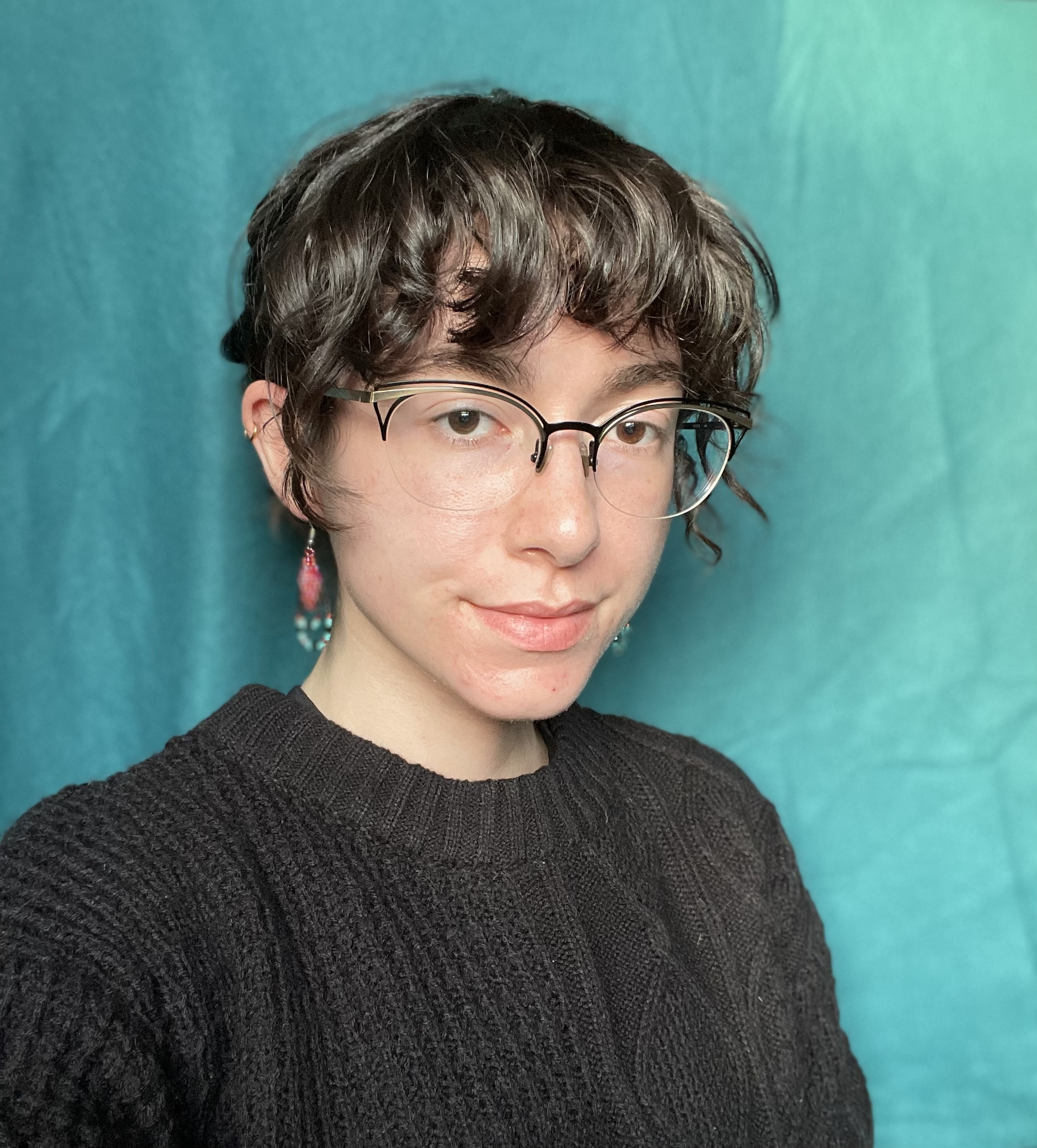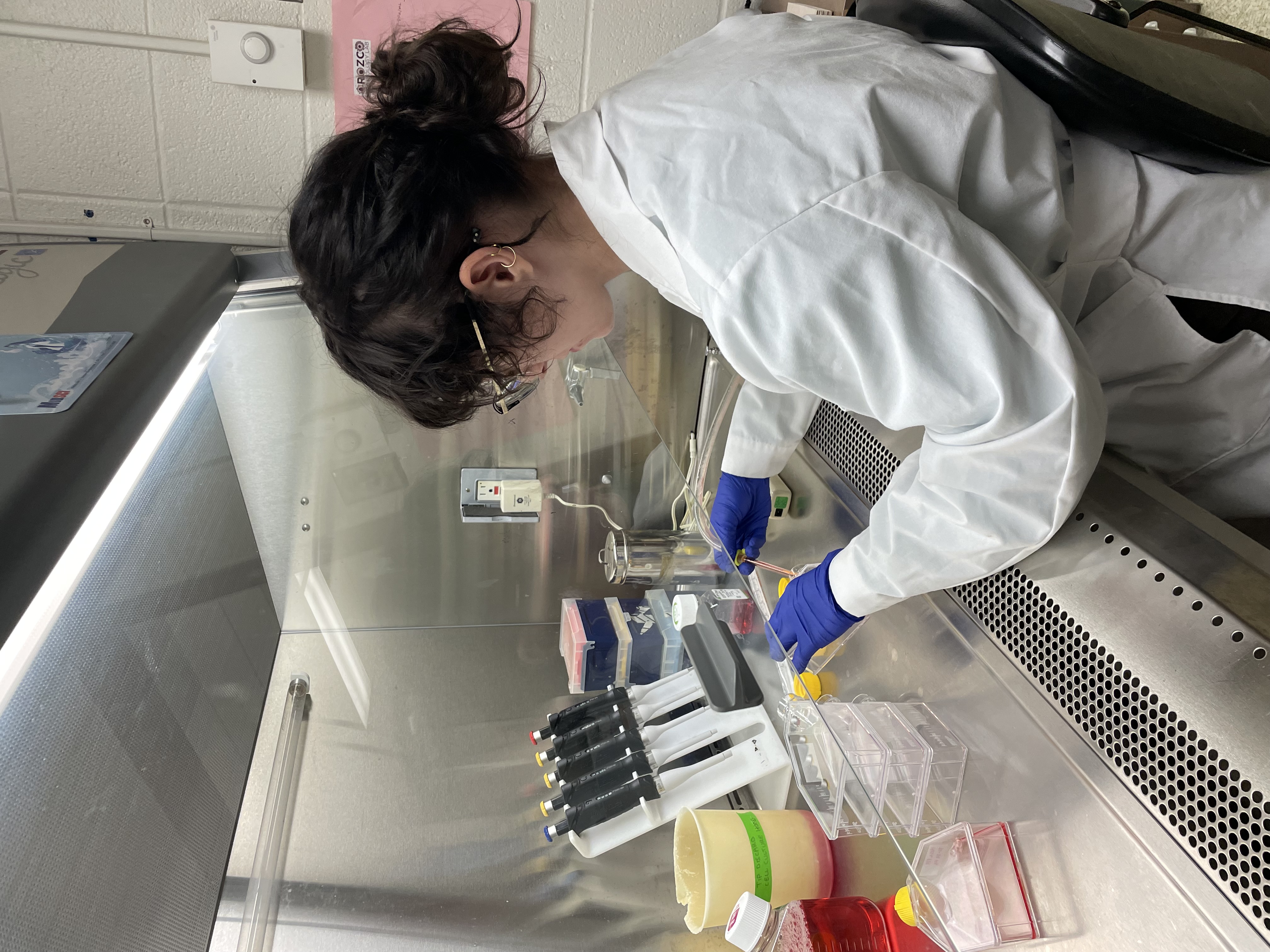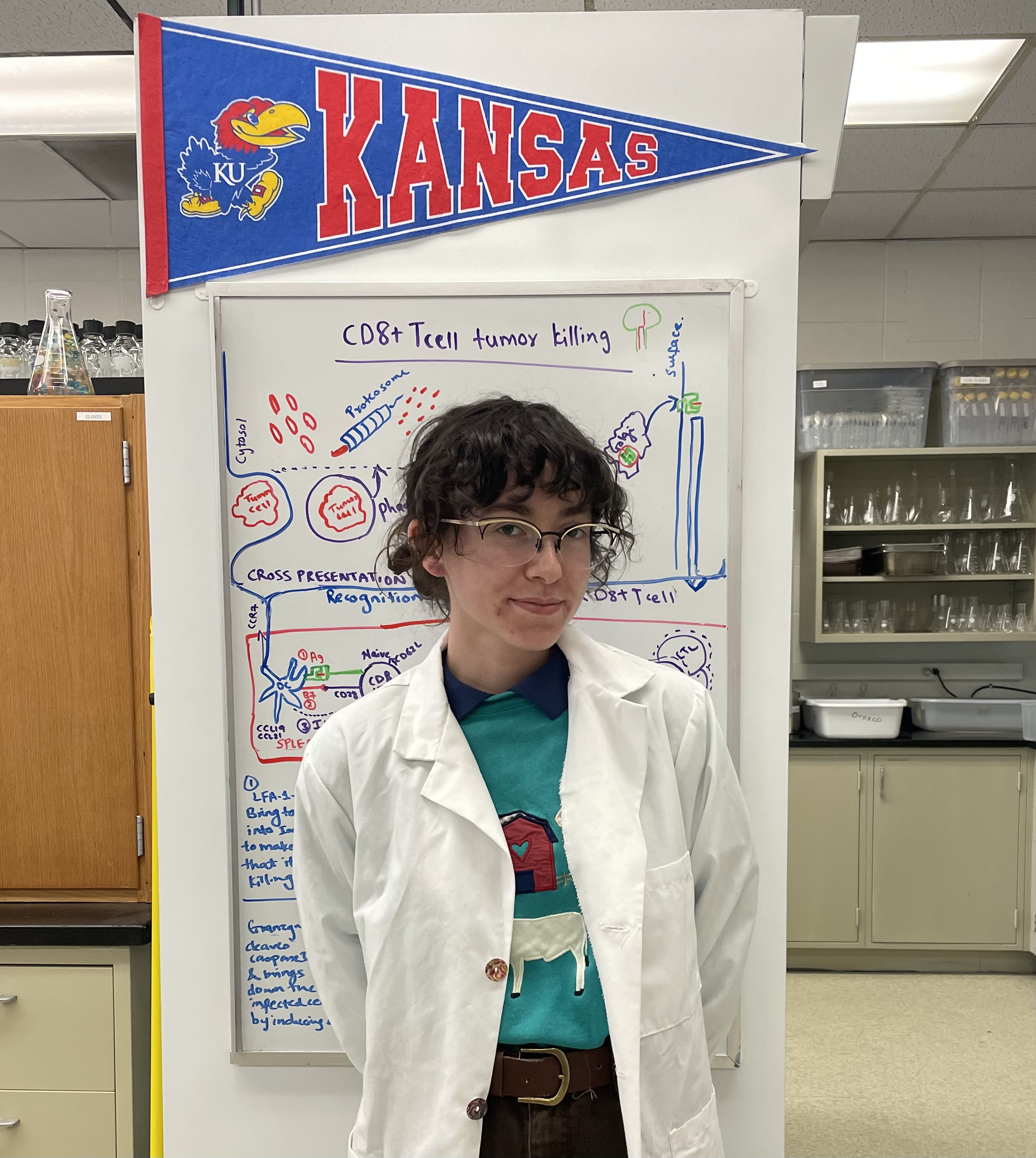Undergraduate Biology Student Researcher: Kate Rosa
Kate Rosa is a is a Junior majoring in Molecular, Cellular & Developmental Biology.

“My first year I was at Emporia State as an ecology major and then I transferred [to KU]. During my freshman year I took part in an REU in South Dakota, where I was looking at genetic disease and doing research that I really loved.
When I was doing my poster presentation [for that REU], people from the community were allowed to come and talk to us, [and one of the visitors] said that her husband also had suffered from the same genetic condition I had been researching, and that seeing my work really helped her understand it more and gave her hope for the future. I realized “Wow, I can actually make a difference in like people's lives while doing research.”
“I just finished my first semester in Dr. Robin Orozco’s lab and then this past summer I went to another REU at Mayo Clinic. I was in the virology and gene therapy department, and I studied under Doctor Autumn Schulze, she researches oncolytic viro therapy, which is where we use viral mRNAs to see if we can try and treat different cancers. That was a lot of fun, and it got me introduced to viral research, which I want to study for the rest of my life.”

Kate's Research at KU
“Right now, we study this gene called PTPN-22, and it is associated with autoimmunity. But in [Dr. Orozco’s] past research, she's also seen that it's been associated with increased viral clearance of chronic diseases like LCMV. I work with a gradstudent, Alec, and we're looking to see if [PTPN-22] can help clearhepatitis-like viruses. We work with the Coronavirus, MHV A59,which replicates in the liver-- and an analog to hepatitis B.
What I do specifically in the lab is I will take spleens of mice that have been infected and I will titer them and we will see how much virus is left in between different genotypes of mice. We also just started trying to isolate natural killer cells from the spleens of mice with the different genotypes to see if there is a different natural killer phenotype between them that might explain the viral clearance.”
What does your research look like on a day-to-day basis?
“I do a lot of cell upkeep and maintenance. We have HeLa cells that we take care of, so oftentimes I'm splitting or plating them. I'll choose a day where I have 2 to 3 hours and I'll do titers, which involves a lot of pipetting and then I'll read the plaques. Someone told me the plaques kind of look like tortillas because they end up being these dark dots on a yellowish background.
Kate's Day-to-Day Research
The NK-cells I’ll usually take a Tuesday or Thursday morning and we'll harvest spleens and then we'll end up dissecting them so we can isolate the
NK cells. A lot of the work pipetting and Doing things that seem tedious, but I
really enjoy the lab environment, we all go eat lunch together and it's a lot
of fun. We have a radio that we playmusic on, it’s such a great lab environment-- so, anything we do, even if it seems boring, is a lot of fun.”
What did you find most challenging about your project?
“Sometimes things just don't work out. We'll do titers and we have to decide several times how much media we were re-suspending our cells at-- so they would be at more concentrated or less concentrated cell amounts-- and then we would put virus in everything.
Then after two days when you tried to read them, the cells would be over confluent and you can't read them, so [that attempt was]worthless. Sometimes it's frustrating when you spend 3 hours actively doing something and then you have to wait 48 hours afterwards, and find you have to completely redo it.
With experiments, the most challenging or frustrating thing is putting so much time into something and then it doesn't work out and then you have to redo it again, but it's just part of the process and the learning experience.”

Kate's Experience with SURGE
Students United for Reproductive & Gender Equity (SURGE), KU's feminist student organization, advocates for reproductive justice, abortion positivity, gender equity, and comprehensive sex-positive education for people of all genders, races, sexualities, and backgrounds at KU and beyond.
“I'm currently the vice president of SURGE. I got involved two semesters ago, they had a Kahoot event about sex education and sex trivia. I went to that and I was like, this is really cool because I did something similar in high school with like a female empowerment club and so I went to a meeting and I was just kind of adopted onto the exec board from there.”
How do you think your experience with SURGE will impact you after graduation?
“SURGE is very service oriented, especially towards campus. As vice president, I do a lot of donation-based things for SURGE. I apply for plan B or condoms or menstrual products, whatever we need.
After graduation, I definitely want to continue like service based stuff, especially with making sure that people have access to menstrual products. I would like to continue that into whatever graduate institution I go to, either get involved with the SURGE chapter there or just continue to volunteer and make sure that I am l doing things for my community.”
What do you wish others knew about SURGE?
“We have a Period Pantry at the Emily Taylor Center that gives free menstrual products and packages to anyone who needs them. They can just stop by the center and ask for them. We also have a bunch of free plan B or any sexual health needs. We have meetings Tuesdays from 6 to 7 that anyone is welcome to come to, held at the Emily Taylor center.”
What have you liked most about your time with KU Biology?
“I think a lot of the professors are very fun people. They get really excited about what they do and that's kind of infectious. I took microbiology with Dr. Hotze and she was so clearly interested and excited about teaching and having students learn about bacteria that it also made me excited to learn. Dr. Hancock came to a research conduct class that I'm involved in as a MARC and McNair scholar, and he was so excited to talk about instances of research misconduct and how we can prevent it, and I just think a lot of the faculty here are so wonderful.
It's made my time at KU a lot easier being able to ask them questions or that I know this person teaching this class and I know that they're a great professor and that they're kind. I feel like the biology department is just very much made whole by so much kind faculty there.”
What advice do you have for other students?
“If you want something, even if it's to be in a program or you want advice, I would just ask, because the worst response that you're going to get is just a ‘No’. Through applying to those things, going to all those places-- all of those things could open up a lot of doors that you never would have thought would have been open for you. But if you never try, you're never going to see whether or not you would have got this.”
What do you plan to do after you graduate from KU?
“I really want to go to grad school. My dream job is studying virology, but I don't know whether that's in an academic or industry kind of place or whether it’s heading my own lab - though apply for grants sounds scary. I'm leaning more towards staff scientist right now, but I really just want to be able to study viruses and have a good work life balance.”